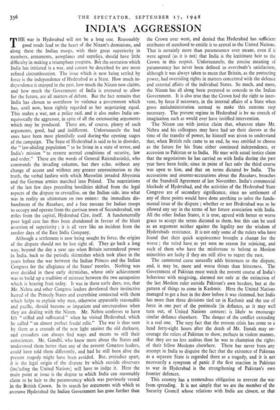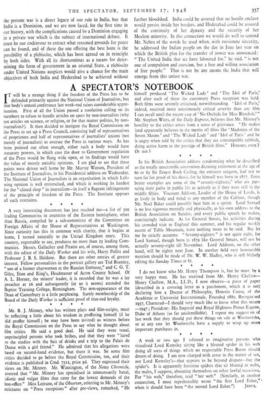INDIA'S AGGRESSION
THE war in Hyderabad will not be a long one. Reasonably good roads lead to the heart of the Nizam's dominions, and along these the Indian troops, with their great superiority in numbers, armaments, aeroplanes and supplies, should have little difficulty in making a triumphant progress. But the operation which India has initiated is a war, and cannot be described by any more refined circumlocution. The issue which is now being settled by force is the independence of Hyderabad as a State. How much in- dependence it enjoyed in the past, how much the Nizam now claims, and how much the Government of India is prepared to allow for the future, are all matters of debate. But the fact remains that India has chosen to overthrow by violence a government which has, until now, been rightly regarded as her negotiating equal. This makes a war, not a police raid, and it also makes India un- equivocally the aggressor, in spite of all the extenuating arguments which may be produced. There are, of course, plenty of such arguments, good, bad and indifferent. Unfortunately the bad ones have been most plentifully used during the opening stages of the campaign. The State of Hyderabad is said to be in disorder, the "law-abiding population" to be living in a state of terror, and India's mission "to restore normal conditions of security, law and order." These are the words of General Raiendrasinhji, who commands the invading columns, but they echo, without any change of accent and without any greater approximation to the truth, the verbal fanfare with which Mussolini invaded Abyssinia and the German armies marched into Poland. The negotiations of the last few days preceding hostilities shifted from the legal aspects of the dispute to crystallise, on the Indian side. into what was in reality an ultimatum on two points: the immediate dis- bandment of the Razakars, and a free passage for Indian troops to occupy and operate from the garrison town of Secunderabad, ten miles from the capital, Hyderabad City, itself. A fundamentally poor legal case has thus been abandoned in favour of the blunt assertion of superiority ; it is all very like an incident from the seedier days of the East India Company.
Although a settlement is now being sought by force, the origins of the dispute should not be lost sight of. They go back a long way, beyond the day a year ago when Britain surrendered power in India, back to the periodic skirmishes which took place in the years before the war between the Indian Princes and the Indian Congress for the allegiance of the States' peoples. Nothing was ever decided in these early skirmishes, whose only achievement was to build up a tradition of mistrust between the two antagonists which is bearing fruit today. It was in these early days, too, that Mr. Nehru and other Congress leaders developed their instinctive hatred of the Princely States and everything connected with them which helps to explain why men, otherwise apparently reasonable and pacific, should become so impatient and unscrupulous when they are dealing with the Nizam. Mr. Nehru confesses to have felt "stifled and suffocated" when he visited Hyderabad, which he called "an almost perfect feudal relic." The war is thus seen by them as a crusade of the new light against the old darkness, and crusaders can always find ways and means to still their consciences. Mr. Gandhi, who knew more about the States and understood them better than any of the present Congress leaders, could have told them differently, and had he still been alive the present tragedy might have been avoided. But, prejudice apart, it is the legal origin of the dispute by which outside observers (including the United Nations) will have to judge it. Here the main point at issue is the degree to which India can reasonably claim to be heir to the paramountcy which was previously vested in the British Crown. In its search for arguments with which to overawe Hyderabad the Indian Government has gone further than the Crown ever went, and denied that Hyderabad has sufficient attributes of statehood to entitle it to appeal to the United Nations. That is certainly more than paramountcy ever meant, even if it were agreed (as it is not) that India is the legitimate heir to the Crown in this respect. Unfortunately, the precise meaning of paramountcy has never been defined to everybody's satisfaction, although it was always taken to mean that Britain, as the protecting power, had overriding rights in matters concerned with the defence and external affairs of the individual States. So much, and more, the Nizam has all along been prepared to concede to the Indian Government. It is also t,rue that the Crown had the right to inter- vene, by force if necessary, in the internal affairs of a State when gross maladministration seemed to make this extreme step necessary. The present regime in Hyderabad is by no stretch of imagination such as would ever have justified intervention.
The Nizam can with justice claim that, whatever plans Mr. Nehru and his colleagues may have had up their sleeves at the time of the transfer of power, he himself was given to understand that, when British rule came to an end, he was entitled to choose as the future for his State either continued independence, or accession to Pakistan or to India. He may with equal justice claim that the negotiations he has carried on with India during the past year have been futile, since in point of fact only the third course was open to him, and that on terms dictated by India. The accusations and counter-accusations about the Razakars, breaches of the Standstill Agreement of last November. India's commercial blockade of Hyderabad, and the activities of the Hyderabad State Congress are of secondary significance, since no settlement of any of these points would have done anything to solve the funda- mental issue of the dispute ; whether or not Hyderabad was to be allowed any say in the terms of her future association with India. All the other Indian States, it is true, agreed with better or worse grace to accept the terms dictated to them, but this can be used as an argument neither against the legality nor the wisdom of Hyderabads resistance. It is not only some of the rulers who have found that their quick acquiescence brought a change for the worse ; the ruled have as yet seen no reason for rejoicing, and such of them who have the misfortune to belong to Moslem minorities are lucky if they are still alive to regret the past.
The communal curse naturally adds bitterness to the dispute, and, it may be, more and worse things than bitterness. The Government of Pakistan must watch the present course of India's behaviour with misgiving, alarmed not only at the extinction of the last Moslem ruler 'outside Pakistan's own borders, but at the pattern of things to come in Kashmir. Here the United Nations managed to get a foot in the door before it was slammed, but India has more than three divisions tied up in Kashmir and the use of force in one part of the peninsula (in defiance, as it may well turn out, of United Nations censure) is likely to encourage similar defiance elsewhere. The danger of the conflict extending is a real one. The very fact that the present crisis has come to a head forty-eight hours after the death of Mr. Tinnah may en- courage the rulers of Pakistan to show, perhaps in violent manner, that they are no less zealous than he was to champion the rights of their fellow Moslems elsewhere. There has never been any attempt in India to disguise the fact that the existence of Pakistan as a separate State is regarded there as a tragedy, and it is not necessarily a symptom of panic if the first reaction in Pakistan to war in Hyderabad is the strengthening of Pakistan's own frontier defences.
This country has a tremendous obligation to prevent the war from spreading. It is not simply that we are the member of the Security Council whose relations with India are closest, or that the present war is a direct legacy of our rule in India, but that India is a Dominion, and we are now faced, for the first time in our history, with the complications caused by a Dominion engaging in a private war which is the subject of international debate. It must be our endeavour to extract what reasoned grounds for peace can be found, and of these the one offering the best hope is the possibility of a plebiscite, which has been agreed on in principle by both sides. With all its shortcomings as a means for deter- mining the form of government in an oriental State, a plebiscite under United Nations auspices would give a chance for the main objectives of both India and Hyderabad to be achieved without further bloodshed. India could be assured that no hostile enclave would persist inside her borders, and Hyderabad could be assured of the continuity of her dynasty and the security of her Moslem minority. In this connection we would do well to remind Mr. Nehru of the words he used when, with passionate sincerity, he addressed the Indian people on the day in June last year on which the British plan for the transfer of power was announced: "The United India that we have laboured for," he said. "is not one of compulsion and coercion, but a free and willing association of free people." That is not by any means the India that will emerge from this unjust war.



































 Previous page
Previous page